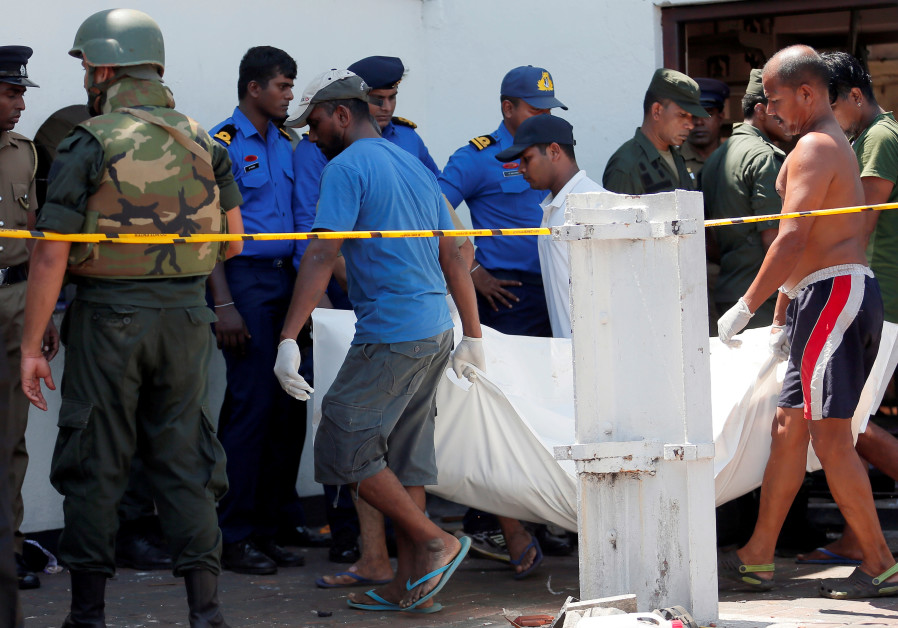Sri Lanka deaths hit 359, U.S. envoy confirms foreign groups responsible

Men carry dead bodies towards ambulances near the St. Anthony’s Shrine, Kochchikade church after an explosion in Colombo, Sri Lanka April 21, 2019.. (photo credit: DINUKA LIYANAWATTE/REUTERS)
COLOMBO – The scale and sophistication of the Easter Sunday attacks on churches and hotels in Sri Lanka suggested the involvement of an external group such as Islamic State, the U.S. ambassador said on Wednesday as the death toll jumped to 359.
The Islamic State militant group claimed responsibility for the coordinated bomb attacks on churches and hotels but gave no evidence to support that.
Sri Lankan officials have blamed two domestic Islamist groups with suspected ties to Islamic State. Details have begun to emerge of a band of nine, well-educated suicide bombers, including a woman, from well-to-do families.
“If you look at the scale of the attacks, the level of coordination, the sophistication of them, it’s not implausible to think there are foreign linkages,” the U.S. ambassador to Sri Lanka, Alaina Teplitz, told reporters in Colombo.
“Exploring potential linkages is going to be part of (investigations),” she said.
Teplitz said the U.S. Federal Bureau of Investigation and the U.S. military were supporting the investigation.
“Our hope is that as a result of our joint efforts we’re going to roll up the perpetrators and collaborators, trace the linkages and be able to prevent this sort of thing from happening in the future.”
Teplitz’s comments came as Sri Lanka’s junior defense minister, Ruwan Wijewardene, conceded that there had been a significant intelligence failure before the attacks, with reports of warnings of strikes not acted on and feuds at the highest levels of government.
“It is a major lapse in the sharing of intelligence information,” Wijewardene told a separate news conference.
“We have to take responsibility.”
Lakshman Kiriella, the leader of parliament, said senior officials had deliberately withheld intelligence about possible attacks.
“Some top intelligence officials hid the intelligence information purposefully. Information was there, but the top brass security officials did not take appropriate actions,” Kiriella, who is also minister of public enterprise, told parliament.
He said information about possible suicide attacks was received from Indian intelligence on April 4 and a Security Council meeting was chaired by President Maithripala Sirisena three days later but it was not shared more widely.
Police earlier said the death toll had risen overnight to 359 from 321, making it the deadliest such attack in South Asian history. About 500 people were wounded.
If the Islamic State connection is confirmed, it would be the deadliest ever attack linked to the group.
The early Sunday bombings shattered the relative calm that has existed in Buddhist-majority Sri Lanka since a civil war against mostly Hindu, ethnic Tamil separatists ended 10 years ago, and raised fears of a return to sectarian violence.
Sri Lanka’s 22 million people include minority Christians, Muslims and Hindus. Until now, Christians had largely managed to avoid the worst of the island’s conflict and communal tensions.
LAW DEGREE
Islamic State said through its AMAQ news agency on Tuesday the assaults were carried out by seven attackers.
However, Wijewardene said there were in fact nine suicide bombers involved in the attacks on three churches and four hotels. Eight had been identified and one of them was a woman, he said.
“Most of the bombers are well-educated, come from economically strong families. Some of them went abroad for studies,” Wijewardene said.
“One of them we know went to the U.K., then went to Australia for a law degree. Foreign partners, including the U.K., are helping us with those investigations,” he said.
Wijewardene told parliament on Tuesday two Sri Lankan Islamist groups – the National Thawheed Jama’ut and Jammiyathul Millathu Ibrahim – were responsible for the blasts. He said on Wednesday the leader of one of those groups blew himself up in the attack on the luxury Shangri-La Hotel in Colombo.
The attacks have already foreshadowed a shake-up of Sri Lankan security forces, with Sirisena saying on Tuesday he planned to change some of his defense chiefs after criticism that the intelligence warnings were ignored.
A total of 60 people had been detained for questioning across Colombo since Sunday, Wijewardene said. That total includes a Syrian, according to security sources.
Police searched more homes overnight, leading to the detention of 18 more people.
The overnight raids included areas near the Gothic-style St Sebastian church in Negombo, north of the capital, where scores were killed on Sunday, a police spokesman said.
An unspecified number of people were detained in western Sri Lanka, the scene of Muslim riots in 2014.
“Search operations are going on everywhere, there is tight checking of Muslim areas,” a security source said.
Most of those killed and wounded were Sri Lankans, although officials said 38 foreigners were also killed. That included British, U.S., Australian, Turkish, Indian, Chinese, Danish, Dutch and Portuguese nationals. Forty-five children were among the dead.
The government has imposed emergency rule and an overnight curfew. It said it has also blocked online messaging services to stop the spread of inflammatory rumors that it feared could incite communal clashes.
Join Jerusalem Post Premium Plus now for just $5 and upgrade your experience with an ads-free website and exclusive content. Click here>>





Comments are closed.